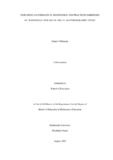
Please use this identifier to cite or link to this item:
https://hdl.handle.net/20.500.14301/114| Title: | EXPLORING MATHEMATICAL KNOWLEDGE AND PRACTICES EMBEDDED IN TRADITIONAL NEWARI OIL MILLS: AN ETHNOGRAPHIC STUDY |
| Authors: | Maharjan, Sanjeev |
| Citation: | Maharjan, S,(2021).Exploring mathematical ideas and concepts embedded in traditional newari oil mills: An ethnographic study |
| Issue Date: | Aug-2021 |
| Publisher: | School of Education |
| School: | SOED |
| Department: | DOSE |
| Level: | Masters |
| Abstract: | We live in a world that is dominated by math-based technology. But most students feel that they cannot do mathematics and they start to hate mathematics. Instead of encouraging fear of mathematics education in students’ minds, mathematics education should adopt a greater understanding of how mathematics is applied in our daily life and how it is embedded in our culture. As their curiosity in mathematics raises, they will be in the position to see that mathematics is extended elsewhere in the classroom, that it has importance in their day-to-day life and their culture. In the context of Nepal, mathematical classroom belongs students from diverse cultural and ethnic groups and hence I felt the necessity to conduct a research study on mathematical integration in a culture that we practice. For this I chose to conduct research on the Newari community with my major research questions; “What mathematical knowledge and practices are embedded in traditional Newari oil mills?” and “How can school mathematics be contextualized through mathematical knowledge and practices embedded in the traditional Newari oil mills?” My research study was guided by a qualitative ethnographic research design. During my field visit, observation and interview with my research participants, I encountered many mathematical practices embedded in traditional oil mills which are simple to understand but not used in our present teaching and learning pedagogy. Instead of using a board and marker for teaching mathematics, allowing students to visit places outside the classroom and observing cultural mathematics in cultural places can be one of the effective ways of teaching mathematics. By doing so, students will find the uses of mathematics in their daily life and will get an interest in mathematics. Therefore, the incorporation of ethnomathematics in mathematics classrooms will give positive change in teaching and learning mathematics. The literature review in my research study supported me to develop my conceptual understanding of related terms that supported me in developing this research work. Research participants were not well educated. They never learnt the process of construction of oil mills in any educational institute. They said that they were not educated enough to directly link the working process of oil mills to mathematics but nowadays they had realized that there are many non/mathematical pieces of knowledge embedded in it. So, they had tried their best to answer my question and tried their best to help me to find my research conclusion. I presented mathematical knowledge and practices embedded in traditional oil mills and possible ways to incorporate them in teaching school mathematics through ethnomodeling. My research will be helpful for mathematics teachers, students, and curriculum experts to integrate ethnomathematics in a mathematics classroom. |
| URI: | http://101.251.6.110:8080/handle/20.500.14301/114 |
| Appears in Collections: | Dissertation |
Files in This Item:
| File | Description | Size | Format | |
|---|---|---|---|---|
| Sanjeev Maharjan Final Dissertation.pdf | 1.7 MB | Adobe PDF |  View/Open |
Items in DSpace are protected by copyright, with all rights reserved, unless otherwise indicated.